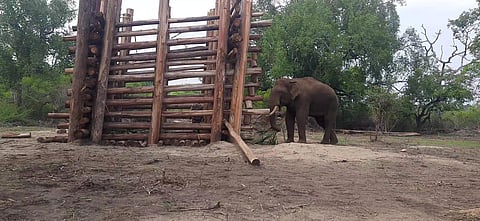

CHENNAI: In a landmark decision, the Tamil Nadu forest department has decided to release a wild tusker back into the jungle for the first time. Chief Wildlife Warden Shekhar Kumar Niraj issued a release order giving the jumbo Rivaldo, who was captured and put inside a kraal for more than two months, his freedom back.
Environment secretary Supriya Sahu confirmed to The New Indian Express that the decision to release Rivaldo was taken after weighing all pros and cons. "In the best interests of the elephant and ecology, we have decided to release Rivaldo back into the wild. The department is planning for a soft release, which means an intermediate location deep inside the jungle, which is far off from Vazhaithottam village, would be identified where he will be made to acclimatise with local environs before releasing him in the open jungle. The process may take several days or even months," she said.
Supriya Sahu and Chief Wildlife Warden Shekhar Kumar Niraj are already in Mudumalai drawing a foolproof plan and constituted a separate committee to execute it. Both the officials will be visiting the intermediate location on Monday which sources said is somewhere near Abhayaranyam and finalise the timeline of the operation.
The decision was taken after veterinarians and ecologists who were tasked to examine the elephant found that the trunk injury, which Rivaldo was carrying for nearly a decade now, became a permanent disability and he has learnt to live with it and concluded that no possible treatment can be given in such cases.
In July 2012, Rivaldo lost 30 cm of his trunk after it got caught in a snare set out to kill wild boar. The wild tusker became habituated to living close to humans in the buffer zone of the Mudumalai Tiger Reserve (MTR), often straying out of the forest and feeding on fruits and sugarcane offered by the locals.
Chief Wildlife Warden Shekhar Kumar Niraj had personally visited Vazhaithottam village on July 10-11 and held detailed discussions with veterinarians, ecologists and scientists. As per Section 11 of Wildlife (Protection) Act, 1972, a captured elephant cannot be kept in captivity unless the Chief Wildlife Warden is satisfied that such an animal cannot be rehabilitated in the wild and the reasons for the same are recorded in writing.
Niraj told The New Indian Express, "I found no reason to keep Rivaldo in captivity. The vets categorically told me that no treatment can be given to Rivaldo to improve his health condition. In such a case, there is no use in putting the elephant inside the kraal, breaking his natural spirits."
The official said it was very important to preserve the genetic diversity of the older males in the population by protecting them and allowing them to breed freely. "As such, it is very important that Rivaldo, who is 36-40 years old, be retained in the breeding population and not be removed from it and brought into captivity. Also, compared to the costs incurred in capturing, training and maintaining this elephant in captivity, managing it in the wild will be far less expensive and ecologically-friendly."
Meanwhile, Rivaldo's release order, accessed by The New Indian Express, also states that the process of karaaling and training an adult into a captivity could be generally torturous, scientifically not well-established and ecologically damaging. "It is observed that the elephant Rivaldo at this advanced age of 36-40 years may not be a right candidate for any kind of training or taming exercises. Such training at this age might not be successful and could make the animal very aggressive," it said.
Rehabilitation plan
Environment secretary Supriya Sahu said, firstly, Rivaldo will be radio collared before moving him out of the kraal. "This will help us continually monitor his movement and stop the animal wandering into human habitations, thereby reducing its dependence on humans for food."
Officials said the animal will be loaded onto an elephant carrier sourced from Satyamangalm Tiger Reserve. He will be moved 23 km from Vazhaithottam beyond Abhayaranyam.
A dedicated team would be set up to monitor and control the movement of the elephant when he is set free. The animal will be positioned for some days at the release site to acclimatise it to new surroundings. "A large enclosure will be built at the location which is close to the Moyar river," an official said.
Conservationists hail release decision
Wildlife conservationists have hailed the decision of the state forest department saying it was purely based on science and ecology, not heeding general public sentiment. N Sadiq Ali, founder of the Wildlife and Nature Conservation Trust, told The New Indian Express that Rivaldo's release will set a right precedent for all future operations.
"I still remember the day when I first saw Rivaldo back in July 2012. He was in pain with a maggot filled wound in the trunk. I was the one who reported it to the forest department. He is a very sweet animal which allowed us to treat the wound without much difficulty. Later, a few individuals took advantage of his social behaviour and started feeding him and over the years reduced him to a beggar. This is the reason why he keeps venturing out of the forest searching for an easy meal in human habitations," Ali said.